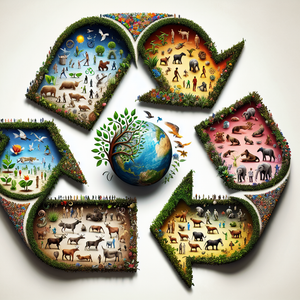Job Hunting in the Age of AI: How Technology is Shaping Job Sites

One of the most notable impacts of AI on job sites is the automation of resume screening. Historically, hiring managers have faced the daunting task of sifting through hundreds, if not thousands, of applications. This process is not only time-consuming but also susceptible to human biases, which can lead to qualified candidates being overlooked. AI algorithms have emerged as a solution to these challenges by quickly analyzing resumes to identify key skills, experiences, and qualifications that align with job descriptions. For example, platforms like HireVue utilize AI to assess applicants' resumes alongside their video interviews, enabling a more objective evaluation process. This dual assessment allows companies to identify talent more effectively while reducing bias linked to age, gender, or educational background. However, job seekers must adapt by tailoring their resumes to include relevant industry-specific keywords, as automated systems may miss nuanced experiences that a human recruiter would appreciate.
Predictive Job Matching: A Tailored Approach
Another transformative aspect of AI in job hunting is predictive job matching. Job platforms such as ZipRecruiter employ sophisticated algorithms to analyze user behavior and preferences, providing personalized job recommendations tailored to individual candidates. These AI systems evaluate factors like search history, application patterns, and even geographic location to suggest roles that align with a candidate's skills and interests. For instance, if a job seeker consistently applies for marketing positions, the AI might recommend related roles in sales or business development that require similar skill sets. This not only saves time for job hunters but also exposes them to opportunities they may not have considered otherwise. By broadening their job search horizons, candidates can increase their chances of finding fulfilling positions that match their abilities.
Enhanced User Experience Through Chatbots
The user experience on job sites has also been significantly improved through the implementation of AI-driven chatbots. These virtual assistants provide immediate responses to user inquiries, guiding job seekers through the application process, answering frequently asked questions, and offering tips on resume writing or interview preparation. Platforms like Jobcase leverage chatbots to maintain user engagement and provide support whenever needed, creating a more interactive and supportive environment. This immediate assistance enhances user satisfaction and can alleviate some of the frustrations commonly associated with job searching. As candidates navigate the complex landscape of job applications, having access to real-time information can make a substantial difference in their overall experience.
The Ethical Considerations of AI in Job Searching
While the advantages of AI in job searching are considerable, it is crucial to address the ethical implications of relying on algorithms. If these systems are trained on flawed data sets or reflect historical biases, they may inadvertently perpetuate discrimination in hiring practices. For example, if an AI is trained on data that exhibits bias against certain demographic groups, it may replicate those biases in its decision-making processes. Job seekers must remain vigilant and advocate for transparency in how AI systems operate. Understanding the algorithms behind job matching empowers candidates to present themselves effectively and navigate the job market with greater awareness. Moreover, it encourages companies to take responsibility for the ethical implications of their hiring technologies and strive for fairness and equity in their processes.
The integration of AI into job searching represents a fundamental shift in how candidates and employers connect. From automated resume screening to predictive job matching and enhanced user interactions, AI is streamlining the job hunting process while also presenting new challenges. As technology continues to evolve, job seekers must adapt their strategies, embracing these innovations while remaining cognizant of the ethical implications. By harnessing the power of AI, candidates can improve their chances of landing their dream jobs while contributing to a more equitable hiring landscape. As job sites continue to evolve, both job seekers and employers must navigate this new terrain wisely. In the age of AI, the future of job hunting is bright, offering unprecedented opportunities for those willing to adapt and engage with these transformative technologies.
AI Talent Acquisition Specialist
Large tech firms like Google and Microsoft, as well as specialized recruiting firms.
Core Responsibilities
Develop and implement AI-driven recruitment strategies that enhance candidate sourcing and selection.
Analyze data from automated screening tools to identify trends and improve hiring processes.
Collaborate with HR teams to ensure alignment between AI tools and organizational hiring goals.
Required Skills
Proficiency in AI and machine learning technologies as they pertain to recruitment.
Strong analytical skills to interpret data and make evidence-based decisions.
Familiarity with diversity and inclusion initiatives to mitigate algorithmic bias.
Data Scientist in Recruitment Analytics
Staffing agencies, HR tech startups, and corporate HR departments.
Core Responsibilities
Design and maintain predictive models to enhance candidate matching and retention strategies.
Conduct A/B testing on recruitment processes to evaluate effectiveness and drive improvements.
Generate insights from recruitment data to inform strategic decisions and optimize resource allocation.
Required Skills
Expertise in statistical analysis and data visualization tools (e.g., Python, R, Tableau).
Experience with predictive analytics and machine learning.
Strong communication skills to present data-driven recommendations to stakeholders.
UX/UI Designer for Job Platforms
Job board companies like Indeed and Glassdoor, as well as UX design agencies.
Core Responsibilities
Create user-friendly interfaces for job search platforms, focusing on enhancing candidate experience through design.
Conduct user research to understand pain points in the job application process and iterate designs accordingly.
Collaborate with product teams to integrate AI features in a way that improves usability and engagement.
Required Skills
Proficiency in design software (e.g., Sketch, Adobe XD) and a strong portfolio showcasing user-centric designs.
Understanding of user experience principles and accessibility standards.
Experience in conducting usability tests and interpreting feedback for continuous improvement.
Ethical AI Consultant in HR
Consulting firms, corporate ethics boards, and non-profit organizations focused on technology ethics.
Core Responsibilities
Advise organizations on the ethical implications of AI tools in recruitment and employee management.
Develop frameworks to assess and mitigate biases in AI systems used for hiring.
Conduct workshops and training sessions to educate HR teams on ethical AI practices.
Required Skills
Strong background in ethics, law, or social sciences as they pertain to technology.
Familiarity with AI technologies and their applications in HR.
Excellent communication and critical thinking skills to navigate complex ethical dilemmas.
Chatbot Developer for Recruitment Solutions
Tech startups focused on HR solutions, established job platforms, and AI development companies.
Core Responsibilities
Design and implement AI-driven chatbots that assist job seekers throughout the application process.
Integrate chatbots with existing recruitment platforms to enhance user engagement and support.
Analyze user interactions with chatbots to continuously improve functionality and user experience.
Required Skills
Proficiency in programming languages such as JavaScript and Python, as well as experience with natural language processing (NLP) frameworks.
Understanding of user experience design to create intuitive and helpful chatbot interactions.
Experience in machine learning to enhance chatbot capabilities over time.


